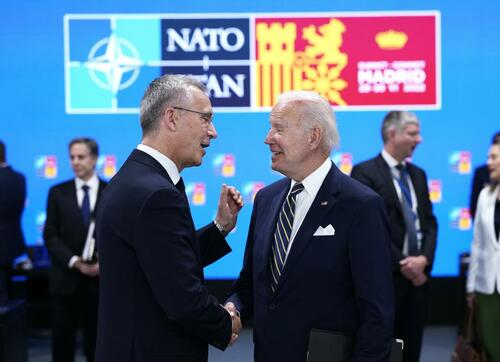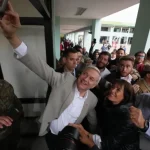
Following calls this week from European officials to put Ukraine on a clear path to NATO membership, and in the wake of Finland's becoming the 31st member state, Washington is issuing words of caution, saying it shouldn't be according to a specific timeline or "road map".
The Financial Times is reporting on significant fissures opening on the issue within the alliance: "The US, Germany and Hungary are resisting efforts from countries such as Poland and the Baltic states to offer Kyiv deeper ties with Nato and clear statements of support for its future membership, four officials involved in the talks told the FT."

And further, "The divisions were made clear at a meeting of Nato foreign ministers in Brussels this week, with member state officials set to spend the next two months locked in negotiations ahead of a leaders’ summit in Vilnius in July."
Polish President Andrzej Duda has been among European leaders pressing for firmer commitments to Kiev from NATO. "I believe that we will succeed in obtaining guarantees [for Ukraine] as a prelude to Ukraine’s future membership in full in the North Atlantic Alliance," Duda said during a visit of President Zelensky this week.
According to more in FT:
All 31 members of the alliance agree that membership is not a short-term option and cannot be seriously discussed while the war is ongoing.
But two people present in the meetings this week said that a growing number support offering Ukraine "a political path" to membership in Vilnius that would “thicken” the bonds between the Brussels-based alliance and Kyiv. The US, however, was pushing back against that proposal, they said.
"The road [to Vilnius] is still very rocky," said a second western official.
The reality remains that NATO's Article 5 collective defense treaty means it doesn't accept members which have conflicts on their borders, much less that have active war zones. Quite obviously this would ensure direct clash with nuclear-armed superpower Russia. But Poland and the Baltic states don't seem to be phased by this in their rush to put Ukraine on a path to NATO.
NATO first gave verbal promises to Ukraine in 2008 that it would eventually join the alliance, which is one of the central factors that led to Putin launching the invasion in February 2022.
Following calls this week from European officials to put Ukraine on a clear path to NATO membership, and in the wake of Finland’s becoming the 31st member state, Washington is issuing words of caution, saying it shouldn’t be according to a specific timeline or “road map”.
The Financial Times is reporting on significant fissures opening on the issue within the alliance: “The US, Germany and Hungary are resisting efforts from countries such as Poland and the Baltic states to offer Kyiv deeper ties with Nato and clear statements of support for its future membership, four officials involved in the talks told the FT.”

And further, “The divisions were made clear at a meeting of Nato foreign ministers in Brussels this week, with member state officials set to spend the next two months locked in negotiations ahead of a leaders’ summit in Vilnius in July.”
Polish President Andrzej Duda has been among European leaders pressing for firmer commitments to Kiev from NATO. “I believe that we will succeed in obtaining guarantees [for Ukraine] as a prelude to Ukraine’s future membership in full in the North Atlantic Alliance,” Duda said during a visit of President Zelensky this week.
According to more in FT:
All 31 members of the alliance agree that membership is not a short-term option and cannot be seriously discussed while the war is ongoing.
But two people present in the meetings this week said that a growing number support offering Ukraine “a political path” to membership in Vilnius that would “thicken” the bonds between the Brussels-based alliance and Kyiv. The US, however, was pushing back against that proposal, they said.
“The road [to Vilnius] is still very rocky,” said a second western official.
The reality remains that NATO’s Article 5 collective defense treaty means it doesn’t accept members which have conflicts on their borders, much less that have active war zones. Quite obviously this would ensure direct clash with nuclear-armed superpower Russia. But Poland and the Baltic states don’t seem to be phased by this in their rush to put Ukraine on a path to NATO.
NATO first gave verbal promises to Ukraine in 2008 that it would eventually join the alliance, which is one of the central factors that led to Putin launching the invasion in February 2022.
Loading…





